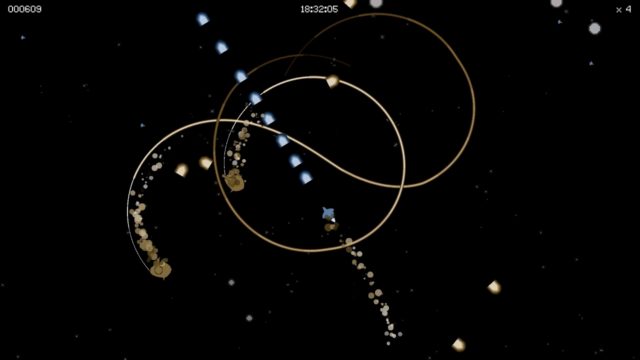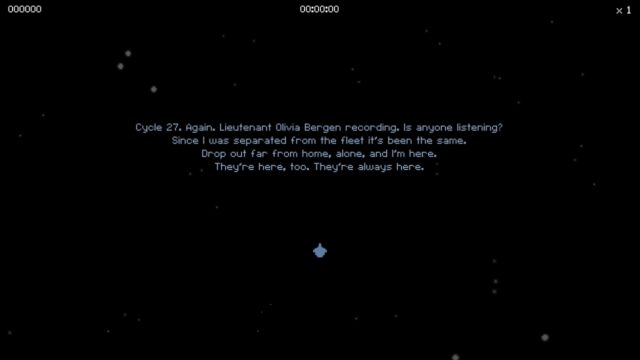Solid shooter gameplay; great use of music; interesting visual and story design ideas.
Uncovering the story really isn't worth the hassle; a few gameplay imbalances; repetitive.
Cycle 28 is an interesting experiment of a game. On the one hand, it is a fairly straightforward, arcade inspired shooter, but on the other, it tries to tell a mysterious story, both in terms of what is happening and how it is presented to gamers. Unfortunately, it doesn’t execute all of these ideas in equal terms.
The core gameplay is simple enough. You control a spaceship by rotating and boosting, which means piloting your ship is all about getting a handle on the momentum as you hurdle through space and carefully apply your thrusters to get where you want to go. Seeing how most games of this ilk favor the more responsive twin-stick take on controls, this approach feels rather fresh and allows for a more notable sense of skill progression as you slowly master the physics. My only real complaint is that I feel the game would have benefited from a brake button. While this might result in a somewhat easier game, I think it also would have reduced the unfair deaths caused by enemies zooming on screen much faster than the current controls allow you to meaningfully react to.

Speaking of enemies, you’ll blow up a lot of baddies in Cycle 28. The game rolls out a large variety of enemies the longer you play in each round. They differ in size, speed, and tactics, though most are more robust than you usually find in this sort of game, making each firefight more complex as different enemy types start appearing together. Your attacks are initially just a simple shot fired from the front of your ship, but as you play and continually best your previous high scores, you unlock upgrades that augment your attacks, allowing you to fire more shots in a variety of directions. However, tying the upgrade system to the player besting their own scores presents a few major problems. First, you can easily game the system by intentionally setting a series of low scores that are super easy to beat, thus allowing you get every upgrade in a few minutes. The other issue is that the way you earn points is poorly balanced. Ideally, you build-up a score multiplier by killing lots of enemies while avoiding incoming enemy fire because getting hit resets it, and you need that multiplier when you are legitimately playing the game. However, the only meaningful way to reliably build that multiplier is by attacking the drones created by carrier-like enemies, because they come in large waves and are easier to take down. However, because it is so easy to get by shots coming from seemingly nowhere, maintaining a multiplier feels more like a result of luck than brilliant play. Also, you can wipe out numerous larger ships and barely increase your multiplier compared to taking down just one squad of drones, so the game is actively disincentivizing you from engaging the enemy until you can find a new batch of carriers. The game is nice enough to give you regenerating health assuming you can stay out of combat for a while, but when combined with this combo system, it really encourages players to spend a surprisingly large time flying away from the enemy.
Where Cycle 28 will probably prove most divisive is in its story. The game presents you as a pilot stuck in a repeating time loop known as Cycle 27, so you are trying to get to Cycle 28. As you die and respawn, you are presented with text logs giving brief insights to your character’s past as while as their evolving mental state. The developers insist there are bigger, more impressive details lurking within the game’s depths, but I only got far enough to encounter a giant law, both figurative and literal. Given sufficient poking and prodding, I imagine one can find the key to progressing and I’ll give credit to the devs for encouraging a community to grow around the game so people can work on solving the mysteries together. However, that community, which largely seems to consist of a Discord server, isn’t all that helpful thanks to countless entries stacked upon one another. The efforts are well-intentioned and interesting but ultimately frustrating, too. Were the core concept and gameplay more appealing, perhaps the struggle would feel more appealing.

Like many retro-inspired indie games, Cycle 28 aims for a minimalist approach to presentation. Your ship is a blue shape while your enemies are a variety of brownish-yellow shapes and the background is a black and white space-scape. This style looks perfectly alright, though it does run into one problem because you can only judge your ship’s current health by whether or not it is leaving a trail of smoke. Unfortunately, that smoke happens to be roughly the same color of enemy ships and projectiles, so it can sometimes be incredibly hard to see in the heat of battle. A contrasting color would have been a much smarter choice. Also, the general issue is made somewhat worse by the fact that the only other feedback you get from being hit is a gentle shake of the controller, a vibration that is imperceptible from the shake you get when one of your shots hits an enemy. Thankfully the soundtrack fares quite well. While it is somewhat repetitive given the nature of the game, the way in which it builds in intensity and complexity the longer each run lasts is incredibly effective.
In many ways I applaud Cycle 28‘s ambition, however I also kind of wish the developers had focused more of that energy on more fruitful endeavors. While the core gameplay is enjoyable, it would have benefited from a few more features and better all-around balancing. The story offers at least some level of intrigue, but the effort needed to unravel it outside of the game doesn’t really feel worth the effort, though I can imagine at least a few dedicated cyber sleuths getting a kick out of it. Considering all of this, we’re really just left with a solid retro-inspired indie shooter based around an interesting nugget of an idea, something that ultimately really isn’t all that uncommon these days.
Nintendojo was provided a copy of this game for review by a third party, though that does not affect our recommendation. For every review, Nintendojo uses a standard criteria.




 ShareThis
ShareThis





